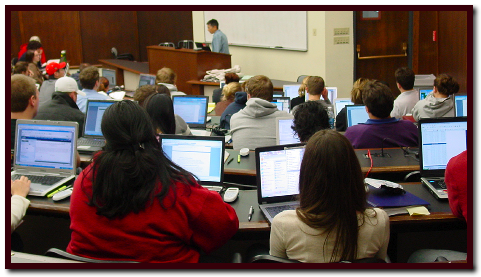« Almost overnight, American CPAs have started to drink, do drugs and philander. | Main | This Blog is a No-Wuss Zone. Anonymous comments ignored. Exception: 'Club Ned'. »
September 23, 2010
Once again: American Law Schools, can you help us all out on that pesky Value Thing?

Watch closely. At some point, a law firm, a law student, or a recent law grad may very well may bring a Rule 11-proof action against a "good" American law school.
It will not be because he or she cannot find a job. It will be simply because they cannot do one.
We are desperate--and burning daylight and money here. Marc Randazza is a San Diego-based First Amendment specialist who writes The Legal Satyricon. Like the undersigned, he is hard-working, works out of several offices, and is obviously having fun. Randazza is irreverent, "not prissy", passionate, mega-competent, and not concerned about what people think. Hear his April 2 NPR interview on SLAPP suits. Or read about abolition of limitations periods in clergy child abuse cases in "If you’re still Catholic...". He and his other writers don't cower behind "anonymity" when they write. Randazza's his own man, and a stand-up guy.
In short, an American. And none of this would be that unusual except that Marc is an American lawyer. And let's face it. Being eccentric, wild and/or "edgy" in American Lawyerland is not a tough mark to hit. Just wear a bow-tie, tasseled loafers and a trench coat. But maybe, say, in public, and wear them all on once, and on a weekday. Ah, live dangerously, lawyer friends. All over the world, we could go nuts--and "get it on" like big dogs.
Last year, Marc wrote "The Worthlessness of American Legal Education", a piece we admired and which is certainly worth your time to read. The theme "what should we expect now from law schools, anyway?" endures at Marc's blog and others. We've written about that theme--from the standpoint of clients as always being the "main lawyer event"--here at this blog for nearly five years. And written about it enough to know it's a very touchy subject.
In the late summer of 2008, we wondered aloud--and just weeks before the federal government's late "announcement" that there was a "recession goin' on"--on whether law students and recent grads should start paying law firms (yes, new lawyers pay the firms) for training to be lawyers who could add value in a shorter amount of time. In fact, our August 27, 2008 post was probably our most clicked-on but yet "unpopular" piece: "Should associates pay their law firms in the first 2 to 3 years?"
American law schools are some of the most impressive places of higher education in the world. They are exciting intellectually, great think tanks for business, and attract mega-talented humans, particularly in the quality of faculty. They hatch presidents, justices, senators, captains of industry, great authors and diplomats. But many law firms these days are meeting new grads who won't be even marginally productive for two to three years. Or longer. And new grads--at a shop that actually tries to train you--often (not always) "get more" than the firm does out of the relationship in those years.
Law schools, certainly, are not in business to pay students to be trained. Students pay the tuition--not the reverse. The schools get the money. The schools don't pay the students to be there to learn.
Which gets us wondering again. Why should law firms pay new grads--even top students from fine schools--if they are often years away from being productive, and the law schools, for all their promise, potential and cache, are doing about 10% of the lawyer-creating job?
In many instances, the new grad is the only real beneficiary in the law firm-employee relationship. Turnover everywhere is relatively high. Many firms get zilch--and start over again. The current situation is bad for clients because it compromises value--and it cannot be good for students who think they are equipped to add value when they are not even close.
We suspect that legal education in recent years appears to have done many students a disservice by making them think that law school--by its very nature of being focused on teaching you "to think" like a lawyer--could ever give students more than 10% of what they need to be full-gauged lawyers and problem solvers.
Law done right is a hands-on profession and takes everything you have, and organizational and managerial skills the schools cannot teach or be expected to teach.
"Thinking like a lawyer" does not inform your every synapse, breath, and moment.
Moreover, lawyering is not necessarily a "PC", gentle or even genteel culture. Are the schools telling them it is?
To be fair, the substance of the work at a client-focused law firm doing higher-end problem-solving (in deals, courts, international work, etc.) may be very cerebral and challenging. A feast of exhilarating ideas and causes. Lucky people leading a Life of the Mind.
But what is the actual tone and atmosphere of an excellent law firm--even the most humane ones--that quickly resolves problems and gets things done? Often it will be more like Rahm Emanuel, John Wayne or Colonel Bill Kilgore in "Apocalypse Now" commanding brainstorming, hard-ass and fully-engaged troops.
It it will be less like Mr. Rogers or Alan Alda whispering kind and nurturing things to the latest crop of Teletubbies and making sure they are okay. Big Bird and Care Bears in the trenches is not an image most of us wish to project to clients. (If we ever do that, please get a big net, okay?)
Bosses at law firms may be Coif, former Law Review editors, and writers of famous Matthew Bender tomes. But they are still bosses who "want stuff". They do not understand (or even like) younger people who can't get it for them. Many law firms are dominated by type-A problem solvers with strong personalities who live to get things done. Let's hope that never changes. It's good for the customers.
You may ask: has the "recession" or downturn in the global economy helped? Has it made students and graduates more likely to stick it out, and compensate for things they may not have gained from their legal educations? Are students and new grads "stepping up" to train themselves?
Answer: No. We, at least, are not seeing it. Nothing has changed.
And finally there's the question: Is it really necessary for law students to be in classroom settings for three years?
At a minimum, we wish that law schools could convey a few truths, and what might be called "old verities", to part-time clerks, summer clerks and grads:
1. Even for the most brilliant, motivated, resourceful and ambitious people, law practice is time-intensive and very hard--especially in the beginning.
2. Graduating from law school with top grades and willing to give practice the old Siwash try is only the beginning of your travail. Again, practicing law is hard. Even harder to learn how. And hard to maintain as years roll by at a comfortable and honorable level of quality. You don't get to say this much: "Sorry, Jack, but I'm on my break."
3. Real-life client problems pose extraordinary ambiguity and complexity (you can't "Google" the answers; you may fret over some projects and have to stay late; at first, it may interfere with your relationships and your "real life").
4. Maybe you'll find that private practice is not for you. It's not about the lawyers, courtliness, lawyer-centric cults of "professionalism", bar associations, wearing cool suits, prestige, money or being in a special club. If you stay in it for all that stuff, even if you make big bucks, you will regret it. No, you will hate it.
5. Clients. Talented people with JDs are legion. It's really about those you serve: the gritty details, hardships, and joys of "getting it right" for them.

Law Schools: Weenie factories? Or where one first learns to think hard, work hard and add value? (Photo: The Situationist)
(from a Dec. 21, 2009 JDH post)
Posted by Holden Oliver (Kitzbühel Desk) at September 23, 2010 12:59 AM
Comments
reading this reminds me that the flaw with most lawyers (and judges) is that you never want to confuse them with the facts
Why is it that the complaints about law schools aways come from people who didn't learn what they should have learned.
For example Duncan King doesn't understand, "why do law firms have such horrific and costly turnover?"
what does he blame the new employee rather than management?
Had Duncan picked up the habit of reading law journals and using the legal indexes in law school he would know the answer, for there have been several excellent articles on how the shape and structure of law firms is a result of ethics rules such as the rule that a young lawyer may leave a law firm, taking its clients.
Confronted with that reality, big law has to balance hiring new lawyers (searching for the very few who have the combination of brains and lack of ethics that they want to keep as partners)and pushing the rest out the door before the clients realize that they could be better and less expensively served by a 5th year associate with her own office. Without new partners there is no one to fund the retirement plans.
Others, with a background in sociology, have written in depth about law firms being a tournament in which the winners are not the kind of people that one wants to win
Posted by: John Davidson at September 24, 2010 12:26 PM
Post a comment
Thanks for signing in, . Now you can comment. (sign out)
(If you haven't left a comment here before, you may need to be approved by the site owner before your comment will appear. Until then, it won't appear on the entry. Thanks for waiting.)